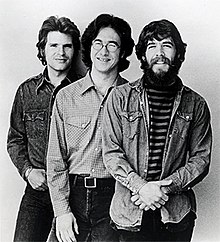Tom Fogerty's departure, discord, and break-up: 1971–1972
Tom Fogerty decided he had had enough and resigned from CCR in early 1971 after the recording of Pendulum; his departure was made public the following February. At first, the remaining members considered replacing him but ultimately continued as a trio.
In the spring of 1971, John Fogerty did an about-face and informed Cook and Clifford that CCR would continue only by adopting a "democratic" approach: each member would now write and perform his own material. Fogerty also would contribute only rhythm guitar to his bandmates' songs. Cook and Clifford, who had wanted more input in CCR's artistic and business decisions, resisted this arrangement. Fogerty insisted they accept it or he would quit the band. Despite the dissension, the trio put its new work ethic to the test in the studio, releasing the Top 10 single "Sweet Hitch-Hiker" in July 1971, backed with Cook's "Door To Door". The band toured both the U.S. and Europe that Summer and Autumn, with Cook's song a part of the live set. In spite of their continuing commercial success, however, relations among the three had become increasingly strained.
The band's final album, Mardi Gras, was released in April 1972, featuring songs written by John Fogerty, Cook, and Clifford, as well as a cover of "Hello Mary Lou" (a song Gene Pitney had originally written for Ricky Nelson). Each member sang lead vocal on the songs written by that member. The album was a critical failure, considered by critics to be of inconsistent quality and lacking in cohesion. Rolling Stone reviewer Jon Landau deemed it "the worst album I have ever heard from a major rock band." The sales of Mardi Gras were weaker than previous albums, ultimately peaking at No. 12, though it still became the band's seventh consecutive studio album to be certified Gold. Fogerty's "Someday Never Comes", backed with Clifford's "Tearin' Up the Country", also cracked the U.S. Top 40.

Niciun comentariu:
Trimiteți un comentariu